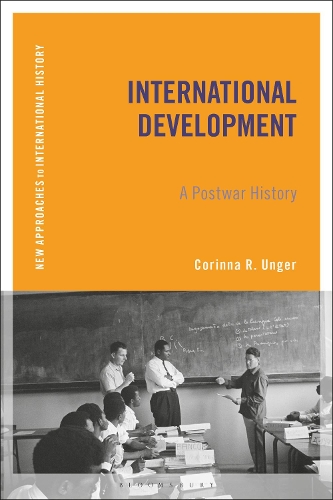
International Development: A Postwar History
(Hardback)
Available Formats
Publishing Details
International Development: A Postwar History
By (Author) Corinna R. Unger
Bloomsbury Publishing PLC
Bloomsbury Academic
6th September 2018
United Kingdom
Classifications
Professional and Scholarly
Non Fiction
338.9109045
Physical Properties
Hardback
272
Width 156mm, Height 234mm
531g
Description
International Development: A Postwar History offers the first concise historical overview of international development policies and practices in the 20th century. Embracing a longue dure perspective, the book describes the emergence of the development field at the intersection of late colonialism, the Second World War, the onset of decolonization, and the Cold War. It discusses the role of international organizations, colonial administrations, national governments, and transnational actors in the making of the field, and it analyzes how the political, intellectual, and economic changes over the course of the postwar period affected the understanding of and expectations toward development. By drawing on examples of development projects in different parts of the world and in different fields, Corinna R. Unger shows how the plurality of development experiences shaped the notion of development as we know it today. This book is ideal for scholars seeking to understand the history of development assistance and to gain new insight into the international history of the 20th century.
Reviews
Ungers book is the best single-volume history of international development published to date. It would make a valuable addition to graduate courses on international and global history, and its clear and direct style would make it useful for select advanced undergraduate courses as well. Professional historians will also find the book an excellent resource for writing lectures on topics ranging from international perspectives on the Tennessee Valley Authority to the origins of development economics. The book should be the starting point for any researcher interested in the topic. * Cold War Studies *
[T]he book is very suitable as an introduction for students of global studies or similar courses, where it can be a good supplement and sometimes also an important correction to economic and social science literature. * Comparativ *
With clarity and authority Unger has provided a firm foundation for those readers eager to grasp a critical global issue, the sprawling and contentious history of international development. * David Ekbladh, Associate Professor of History, Tufts University, USA *
In her masterful survey of the literature, Corinna Unger traces the forerunners of development aid yet emphasizing that the Second World War and the Cold War set a different framework for international development. She highlights the origins of great power competition as well as the role of international organizations, and points to the importance of small donor states, recipient nations and academics. Unger discusses the ideas that created the changing fads of development aid and the practices that at times reinforced and as often undermined foreign aid orthodoxy. International Development is what old hands in the field have long wished they could tell their students to read. It is for both teachers and graduate students the point of departure for new adventures in the field of the history of development aid. * Helge Pharo, Professor Emeritus of International History, University of Oslo, Norway *
Author Bio
Corinna R. Unger is Professor of Global and Colonial History (19th and 20th centuries) at the European University Institute, Florence, Italy.
